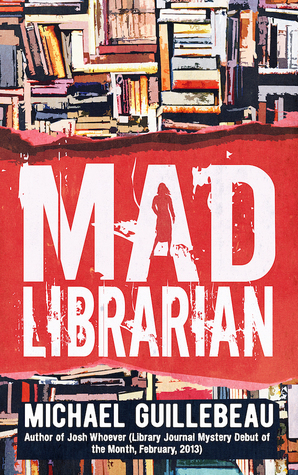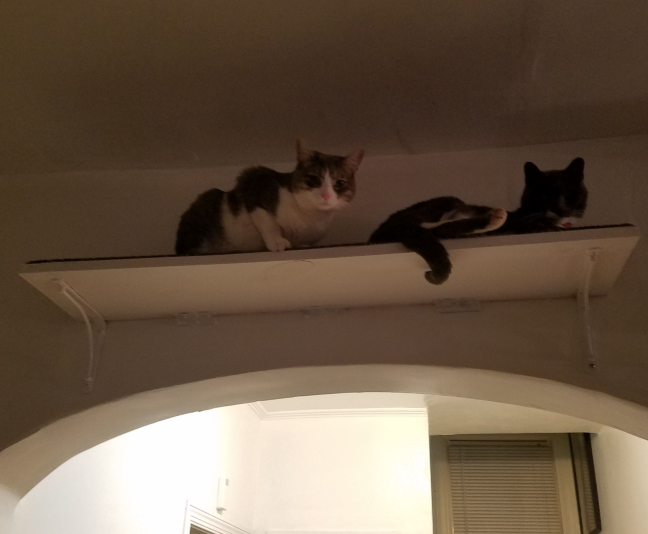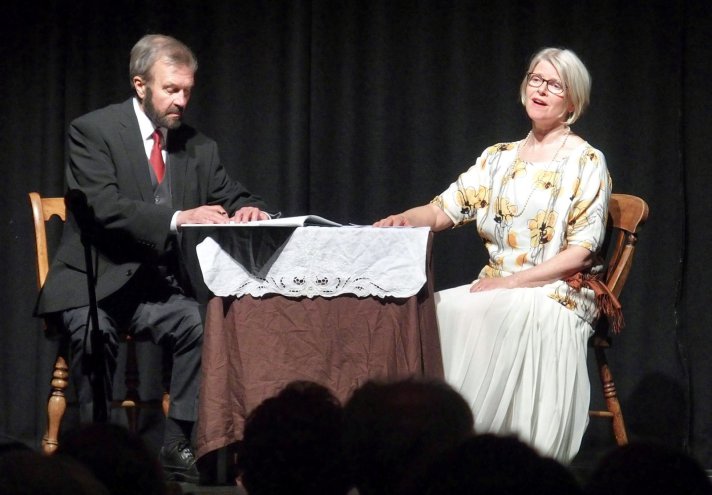 Image of book cover from GoodReads
Image of book cover from GoodReads
Title: MAD Librarian
Author: Michael Guillebeau
Category: Adult Thriller
Publisher/Date: Madison Press/1 December 2017
Edition: eBook (ARC from publisher via LibraryThing)
Pages: 404
Goodreads: https://www.goodreads.com/book/show/35900513-mad-librarian
This book is truly every librarian’s dream come true. After fighting budget battles over and over again, librarian Serenity has lost her library funding. What’s a librarian gonna do? How about ripping off the city that’s ripping off its citizens? Serenity begins helping herself to the funds that local politicians have been setting aside for their own personal “rainy day “. With the money she amasses she can build a library to thrill readers everywhere. Problem is, those politicians aren’t too thrilled to see their money disappearing and they plan to do anything to get it back. Why in the world are libraries always under threat? A funny, moving story of our most precious institutions under threat
Half of all profit from MAD Librarian will go to the MAD Librarian Fund for librarians (madlibrarian.org.) The intended audience for this book is anyone who is mad about all that our libraries have to do with too little support, and dream of what they could do with more.
I received an ARC via LibraryThing in exchange for an honest review.
I am a library and information science master’s student, so I had high hopes for this book. Unfortunately, I had a lot of issues with it. I had a really hard time getting through this book because it came across as poorly-executed satire with caricatures for characters and so many stereotypes that I felt kind of sick.
This is going to be rant-y and slightly disorganized, and there will be spoilers, so proceed with caution.
I’m going to preface this with the fact that I consider the word “m*d” to be ableist and do not use it. I’m giving the title a pass because “MAD” is an abbreviation for “Maddington,” which is the name of the town, however the word “m*d” is used in an ableist context many times throughout the book. I’m not going to talk about this much because I’d sound like a broken record with how many times I’d have to mention it, but know that that is an issue.
Let’s start with sexual harassment in this book. The very first scene in this book involves a man revealing his penis in the middle of the public library for no real reason; it was done for shock value and has absolutely nothing to do with the rest of the story. Serenity, the librarian, doesn’t report him despite that this has apparently happened multiple times and there are apparently children in the room; instead she chooses to cause him physical pain in order to chase him out. This wasn’t funny or intriguing. I almost stopped reading right here, but wanted to give the book a chance.
Within a couple chapters, the power-hungry councilman (who is apparently in charge of everything for no reason other than he wants to be in charge?), who is also a doctor, harasses Serenity when she approaches him about getting a larger budget for the library. It’s mentioned that he prefers people he’s meeting with, in all situations, to sit on his examination table wearing a hospital gown, and then he makes a suggestion about taking Serenity’s temperature with a rectal thermometer.
What. The. Fuck.
Serenity does absolutely nothing about this. The “villains” in this story all seem to objectify women to emphasize that they’re bad people, but at the same time there is no consequence for their actions and they’re still in charge of everything overall. Their behavior comes off as wooden and cartoonish, and it’s pretty damn gross.
There are also a few instances of body-shaming. There are multiple instances of characters making fun of other characters’ penis sizes in order to challenge their masculinity, which as a nonbinary trans person makes me really uncomfortable because the size of a person’s penis, or whether they even have one, has nothing to do with their masculinity. There was also fat-shaming when discussing the mayor of the town; he is described as “five feet tall and five feet around” and made fun of for his weight and size.
So, I don’t know if the author really meant “five feet WIDE,” but “five feet AROUND” is not all that large. I don’t like fat-shaming, and I don’t like making fun of people’s weight when they are of about an average size. Neither of these things are okay. Commenting on people’s weight is not okay.
Additionally, there was some racism in this book. Serenity’s young coworker, “Doom,” appears to be a pretty stereotypical angry Black woman. She’s violent, accused of murder because she has an interest in murders in literature, and depicted as if she has less than a high school-level of knowledge. Her skin color is described with food metaphors, and she brings up slavery when Serenity tells her that dealing with her is like dealing with a teenager. She also tries to forge Serenity’s signature, and Serenity describes her effort as “like something from the Nazis,” typing Doom’s actions further to stereotyped violent tendencies. Nothing about this character feels realistic, and the number of times Serenity has to reiterate that Doom is Black is nauseating.
The governmental structure of this town felt extremely unrealistic and it felt like there was absolutely no research done into how a small-town government actually works. First off, there appeared to be no checks-and-balances anywhere in the government. The creepy councilman with a fetish for rectally taking the temperatures of random women appears to have a disproportionate amount of power as he ignores protocol at meetings, writes Serenity off as a beurocrat and gaslights her by saying that the library budget issues are her fault because she wants to follow protocol and that’s apparently a bad thing, and threatens the job of another councilperson who considers having a different opinion from his. Just how did this guy get into office, exactly? He doesn’t have the townspeople at heart at all, so why did they vote him into this seat? Was he even voted in at all?
Additionally, the council apparently forces library employees to do other city work for no pay on their own time, which is incredibly illegal. This is never called out and there are no consequences to this other than the frustration of the employees. Serenity’s husband is a COP and not even HE does anything about this. No one is reported for their behavior, and apparently the townspeople are completely ignorant of everything their government does, which… Seriously? Does ANYONE in this town have an interest in what goes on in it? The employees grumble, but some of them actually go through with this without complaining because they think it MIGHT help the library! The library has three employees, and NONE of them have ANYTHING resembling a work-life balance. They don’t do anything at home, don’t have any hobbies other than being obsessed with murder and getting a new tattoo every day after work. There’s nothing healthy about the lifestyle of these librarians.
Let’s talk about Serenity herself. I did not like her as a character. She was terrible to her husband – she would sometimes like him and sometimes send him off to bed in the guest room because she didn’t want him in their bed anymore despite that he hadn’t actually done anything. She is also completely unable to have a serious conversation with him while they aren’t having sex – in a sex scene that feels incredibly shoe-horned in just for the sake of including sex, they have a conversation about what Serenity had been up to with some orgasms thrown into it. It was basically a plot summary of the book with some moaning here and there, and it was really weird. Is it that hard to just talk to her husband? If sex is necessary to a relationship actually having productive conversations, that’s really not a good sign. Additionally, almost immediately after she slips her husband two sleeping pills just to sneak away from him, and that’s really awful because medication abuse is a real issue, and this is actual abuse between partners. There is nothing okay about messing with your partner’s medications. This could be dangerous to their health.
This doesn’t even include Serenity’s other characteristics and behaviors. She steals without regret, drinks on the job just because, and apparently cannot budget a thing. Everything from the library’s budget apparently goes into some “special projects” fund, and there is no money allocated for utilities! You’d think that utilities would be allotted space in the budget regardless of how much the library is given, and as the head librarian it’s Serenity’s job to make sure that money is set aside for this BEFORE the bills are due, not after utilities are being threatened. I don’t know what she did with the rest of the money in the budget, but it came off as poorly-organized, which can cause a library’s downfall no matter how much they have. Serenity also seriously contemplates bringing an AK-47 to a council meeting and shooting everyone, and when writing her speech for the council meeting she makes concerns about “reverse sexism” because the men in the room might be offended by being mentioned AFTER women. Considering that I’m not even sure whether any women other than Serenity were actually present in the room during the council meeting, I felt that this was unnecessary and pretty gross. Who cares?
I also didn’t like how librarians were portrayed in this work – it seemed to rely a lot on stereotypes from the past that aren’t really a part of modern libraries or librarianship. The most glaring stereotype was that of the librarian having lots of time to read while they’re on the job. Librarians have a job and that is to serve their patrons. They need to have knowledge of books in order to do readers advisory, yes, but just sitting there reading all the time is going to prevent the library from working properly, especially if there are only three people total on staff.
There was also a “books vs. Internet” fallacy set up in this book. Despite that Serenity’s initial problem is that there’s no money in the budget to pay the Internet bill, the council seems to be in favor of getting rid of all books and relying on the Internet alone. Although she’d previously been concerned about not having the Internet in the library, Serenity started shooting it down and talking as if books are THE WAY. The thing is, this doesn’t work. In general, librarians use both of these things to complement each other. The issue at hand isn’t which medium you’re using; it’s whether you know how to tell which sources are credible. There are bad eggs on the Internet AND in books, and both are important for being well-rounded information professionals. We don’t get a sense of this in this book at all, and I felt extremely irritated by this because with more research this really could have been a great opportunity to teach readers what librarians actually do instead of further spreading these stereotypes when a lot of people still find it hard to take librarians seriously. (I once had a person compare my getting an MLIS to her cousin’s bachelor’s degree in growing grass. For what it’s worth, grass-growing is complicated and that’s probably a pretty agricultural degree. That didn’t stop her from sneering at it and making fun of it as if it’s worthless.)
Finally, other than the presence of death threats which were apparently just words on paper, there are literally no consequences for any of Serenity’s behavior, from lying to her husband to stealing millions of dollars from the city. The story ends with her having the new library she built with the money she stole. This ending felt so abrupt and strange because with how threatening and creepy the “bad guys” had been at the beginning of the story, you’d think that they’d try to do SOMETHING at the end other than deliver empty threats. There are no consequences for ANYONE in this story. Why is there no law in place for anything? I felt frustrated with the ending and it felt like it was unfinished.
Another reviewer mentioned that apparently this is supposed to be satire, but the thing is satire really only works if the story feels like it’s something that could actually happen. The abundant stereotypes and lack of research made the story feel unrealistic, and the satire fell flat for me. Because of this, I can’t really recommend reading this. I do like that half of the proceeds from each copy sold are given to libraries; that’s really nice. I genuinely believe that the author loves libraries and wants others to love libraries too, however I don’t think he has quite enough knowledge about the inner-workings of the library profession to make a story like this work. It was a good attempt, but it didn’t quite work.
Final rating: 2 out of 5 stars
Advertisements Share this:




